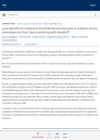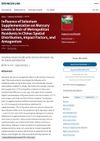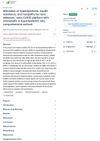 2 citations,
February 2021 in “The Journal of clinical and aesthetic dermatology”
2 citations,
February 2021 in “The Journal of clinical and aesthetic dermatology” Understanding the cause of bitemporal hair loss is key to deciding the right treatment.
 1 citations,
July 2021 in “Journal of Skin and Sexually Transmitted Diseases”
1 citations,
July 2021 in “Journal of Skin and Sexually Transmitted Diseases” Lipedema is a painful fat disorder in women that's hard to treat, often worsens with hormonal changes, and requires symptom-focused therapies.
1 citations,
May 2017 in “InTech eBooks” The chapter explains common scalp conditions, including infections, infestations, and tumors.
 September 2023 in “F&S reports”
September 2023 in “F&S reports” PCOS may increase the risk of mental health issues like depression and anxiety.

Thermal spring waters and their microbes could be good for skin health and treating some skin conditions in skincare products.
 January 2022 in “Clinical Cases in Dermatology”
January 2022 in “Clinical Cases in Dermatology” Lack of certain nutrients may contribute to hair loss and proper diet or supplements could improve it.
 30 citations,
October 2014 in “PLOS ONE”
30 citations,
October 2014 in “PLOS ONE” BAF200 is essential for proper heart and coronary artery formation.
 38 citations,
January 2014 in “International Journal of Endocrinology”
38 citations,
January 2014 in “International Journal of Endocrinology” Adrenal disorders can cause lasting brain and behavior issues in children.
 7 citations,
January 2007 in “Elsevier eBooks”
7 citations,
January 2007 in “Elsevier eBooks” Shampoos clean hair mainly with surfactants and have added ingredients for extra benefits.
 36 citations,
January 2010 in “Human & experimental toxicology”
36 citations,
January 2010 in “Human & experimental toxicology” Eating paradise nuts led to selenium poisoning, causing nausea, hair loss, and other symptoms in two women.
 22 citations,
August 2019 in “Environmental research”
22 citations,
August 2019 in “Environmental research” Pseudomonas sp. T5-6-I bacteria increase selenium uptake in Brassica oleracea plants by 130%.
 20 citations,
February 2013 in “Nutrition”
20 citations,
February 2013 in “Nutrition” Selenium-enriched green tea might be a safe prebiotic for gut health.
 6 citations,
March 2011 in “Experimental Dermatology”
6 citations,
March 2011 in “Experimental Dermatology” Too much or too little selenium in the diet can cause hair loss and graying in mice.
2 citations,
October 1961 in “Experimental Biology and Medicine” Natural feedstuffs help reduce muscular dystrophy in rabbits more than selenium or vitamin E alone.
 1 citations,
August 2023 in “Journal of cosmetic dermatology (Print)”
1 citations,
August 2023 in “Journal of cosmetic dermatology (Print)” Too much selenium can cause hair loss and nail problems.
1 citations,
March 2020 in “̒Ulūm-i dārūyī” Selenium supplements improved liver and kidney function and reduced hair loss in beta-thalassemia major patients.
1 citations,
September 2019 in “Journal of cosmetic dermatology” Lead and selenium levels don't cause premature graying.
 October 2023 in “Èkologiâ čeloveka”
October 2023 in “Èkologiâ čeloveka” People in Moldova have less selenium in their hair than recommended, which may contribute to hair loss.
 June 2023 in “Skin Research and Technology”
June 2023 in “Skin Research and Technology” The supplement with amino acids, iron, selenium, and marine hydrolyzed collagen improved hair growth more than drug treatment alone, with most people tolerating it well.
January 2021 in “Agrobiological records” Biofortifying fruits and vegetables with selenium can improve dietary intake and prevent health issues.
Four bacteria from the lab were found to be resistant to selenium.
The levels of zinc, vitamin D, ferritin, and selenium are different in people with androgenic alopecia compared to a control group.
April 2017 in “The FASEB journal” Low selenium levels worsen health but increase lifespan in mice.
Adding zinc to papaya extract speeds up wound healing.
 September 2024 in “Journal of the American Academy of Dermatology”
September 2024 in “Journal of the American Academy of Dermatology” Selenium disulfide shampoo effectively reduces dandruff and is well-liked by users.
 February 2024 in “Exposure and Health”
February 2024 in “Exposure and Health” Selenium supplements may reduce mercury levels in the hair of city dwellers in China.
 January 2023 in “Research Square (Research Square)”
January 2023 in “Research Square (Research Square)” Nano selenium and CoQ10 helped reduce blood fat levels and insulin resistance while preventing muscle damage from statin drugs in rats.
23 citations,
February 2017 in “Journal of dermatology” Low serum levels of zinc and selenium may increase the risk of alopecia areata.
 4 citations,
July 2012 in “Dermatologic Clinics”
4 citations,
July 2012 in “Dermatologic Clinics” New biopsy techniques and tools improve alopecia diagnosis, and both too much and too little selenium can cause hair loss.



















